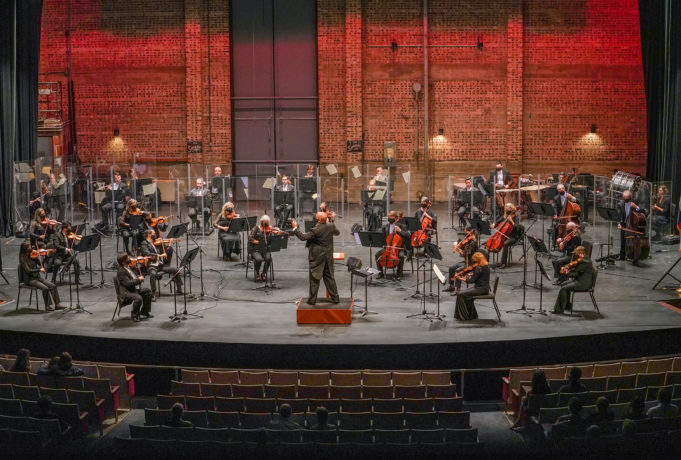After being given short notice that Bass Performance Hall would not be available for in-person concerts this fall, Fort Worth Symphony Orchestra leadership found a sound alternative: Will Rogers Memorial Auditorium. Friday’s opening concert, conducted by Patrick Summers, showed that safety precautions are a top priority. Touchless temperature readings were taken at the door, and face masks were required inside.
Couples and groups can sit together, but each group is spaced two seats apart, and every other row is unseated. The FWSO is using fewer musicians to accommodate social distancing on stage. Plexiglass shields partitioned the brass and woodwind musicians at Friday’s performance. As Summers stepped on stage, the audience rose for “The Star-Spangled Banner.”
The first of three works performed that evening, Rossini’s overture to “The Barber of Seville,” showed a more transparent side, acoustically speaking, of the orchestra. The acoustics of the hall and lighter orchestration allowed for each instrument to be distinctly heard — a rarity in Bass Performance Hall. The musicians played to the hall’s distinct qualities rather than against it. The conductor used subito pianos to great effect, creating drastic changes in the soundscape that played well with the humorous intent of the piece. The overall effect was one of a chamber work that allowed for dialogue between musicians and an appreciation for the timbral effects that are possible when musicians are well attuned to each other and the conductor.
Pianist Stewart Goodyear reenvisioned a piano concerto stalwart with his performance of Saint-Saëns’ Second Piano Concerto. From the first keystroke of the opening cadenza, Goodyear dove headlong into the work and did not submerge until the concerto’s conclusion. Goodyear ebbed between agitation and restraint throughout the first movement. The piano enjoyed a nice balance against the lighter orchestra. The second movement, which could become an afterthought in less capable hands, remained a virtuosic showcase for Goodyear’s technical wizardry. The final movement began and ended at breakneck speed. After the concerto concluded, Summers addressed the audience.
“We are joyed and overwhelmed to be making music live at all,” he said. “Thank you for making this one of the only orchestras that is working during this time.”
The audience replied to the sentiment with heartfelt applause.
Mendelssohn’s Fourth Symphony concluded the concert. The sunny, optimistic work was a fitting beginning to a concert season that was preceded by months of isolation and uncertainty over COVID-19. The work, masterfully performed, captured the mix of emotions that now shapes daily life for many Americans. The decision to resume live concerts was probably a difficult one. Music offers a unique means for processing complex experiences like, say, living during a pandemic. The FWSO appears to be in top form, and the performance’s passion showed that the ensemble understands its newfound role as a source of escape and joy during difficult times.
Rossini, Saint-Saëns, and Mendelssohn continues Sunday, 2 p.m. at Will Rogers Memorial Auditorium. Tickets can be purchased by calling 817-665-6000.












